#Solarpunk Presents Podcast
Explore tagged Tumblr posts
Text
Happy 2025, friends. We are excited to announce that we are rolling out a new Patreon tier... and it's only $1 USD! With this tier, you can access our new monthly video call / hangout, a perk that is included with all other tiers now. Ariel and Christina will alternate hosting these chats in their respective time zones, using the Jitsi video platform, and each hangout will have a loose theme or a few questions to get the conversational ball rolling - although it's certainly not required to stick to the topic ;)
I don't think any of us can say for certain what 2025 will bring, but it's getting real dark out there, and there's a lot that actively tries to break us up due to gender, race, class, etc so we stay in our own little silos and can't organize or even converse together. So we want to be intentional about curating community, especially amongst our followers and fellow solarpunks.
Anyway, here is the link to our Patreon, where you can check out our shiny new $1 tier if you are so inclined: https://www.patreon.com/solarpunkpresents
Hope to see you online later this month!
16 notes
·
View notes
Text
I’ve teased it. You’ve waited. I’ve procrastinated. You’ve probably forgotten all about it.
But now, finally, I’m here with my solarpunk resources masterpost!
YouTube Channels:
Andrewism
The Solarpunk Scene
Solarpunk Life
Solarpunk Station
Our Changing Climate
Podcasts:
The Joy Report
How To Save A Planet
Demand Utopia
Solarpunk Presents
Outrage and Optimisim
From What If To What Next
Solarpunk Now
Idealistically
The Extinction Rebellion Podcast
The Landworkers' Radio
Wilder
What Could Possibly Go Right?
Frontiers of Commoning
The War on Cars
The Rewild Podcast
Solacene
Imagining Tomorrow
Books (Fiction):
Ursula K. Le Guin: The Left Hand of Darkness The Dispossessed The Word for World is Forest
Becky Chambers: A Psalm for the Wild-Built A Prayer for the Crown-Shy
Phoebe Wagner: When We Hold Each Other Up
Phoebe Wagner, Bronte Christopher Wieland: Sunvault: Stories of Solarpunk and Eco-Speculation
Brenda J. Pierson: Wings of Renewal: A Solarpunk Dragon Anthology
Gerson Lodi-Ribeiro: Solarpunk: Ecological and Fantastical Stories in a Sustainable World
Justine Norton-Kertson: Bioluminescent: A Lunarpunk Anthology
Sim Kern: The Free People’s Village
Ruthanna Emrys: A Half-Built Garden
Sarina Ulibarri: Glass & Gardens
Books (Non-fiction):
Murray Bookchin: The Ecology of Freedom
George Monbiot: Feral
Miles Olson: Unlearn, Rewild
Mark Shepard: Restoration Agriculture
Kristin Ohlson: The Soil Will Save Us
Rowan Hooper: How To Spend A Trillion Dollars
Anna Lowenhaupt Tsing: The Mushroom At The End of The World
Kimberly Nicholas: Under The Sky We Make
Robin Wall Kimmerer: Braiding Sweetgrass
David Miller: Solved
Ayana Johnson, Katharine Wilkinson: All We Can Save
Jonathan Safran Foer: We Are The Weather
Colin Tudge: Six Steps Back To The Land
Edward Wilson: Half-Earth
Natalie Fee: How To Save The World For Free
Kaden Hogan: Humans of Climate Change
Rebecca Huntley: How To Talk About Climate Change In A Way That Makes A Difference
Christiana Figueres, Tom Rivett-Carnac: The Future We Choose
Jonathon Porritt: Hope In Hell
Paul Hawken: Regeneration
Mark Maslin: How To Save Our Planet
Katherine Hayhoe: Saving Us
Jimmy Dunson: Building Power While The Lights Are Out
Paul Raekstad, Sofa Saio Gradin: Prefigurative Politics
Andreas Malm: How To Blow Up A Pipeline
Phoebe Wagner, Bronte Christopher Wieland: Almanac For The Anthropocene
Chris Turner: How To Be A Climate Optimist
William MacAskill: What We Owe To The Future
Mikaela Loach: It's Not That Radical
Miles Richardson: Reconnection
David Harvey: Spaces of Hope Rebel Cities
Eric Holthaus: The Future Earth
Zahra Biabani: Climate Optimism
David Ehrenfeld: Becoming Good Ancestors
Stephen Gliessman: Agroecology
Chris Carlsson: Nowtopia
Jon Alexander: Citizens
Leah Thomas: The Intersectional Environmentalist
Greta Thunberg: The Climate Book
Jen Bendell, Rupert Read: Deep Adaptation
Seth Godin: The Carbon Almanac
Jane Goodall: The Book of Hope
Vandana Shiva: Agroecology and Regenerative Agriculture
Amitav Ghosh: The Great Derangement
Minouche Shafik: What We Owe To Each Other
Dieter Helm: Net Zero
Chris Goodall: What We Need To Do Now
Aldo Leopold: A Sand County Almanac
Jeffrey Jerome Cohen, Stephanie Foote: The Cambridge Companion To The Environmental Humanities
Bella Lack: The Children of The Anthropocene
Hannah Ritchie: Not The End of The World
Chris Turner: How To Be A Climate Optimist
Kim Stanley Robinson: Ministry For The Future
Fiona Mathews, Tim Kendall: Black Ops & Beaver Bombing
Jeff Goodell: The Water Will Come
Lynne Jones: Sorry For The Inconvenience But This Is An Emergency
Helen Crist: Abundant Earth
Sam Bentley: Good News, Planet Earth!
Timothy Beal: When Time Is Short
Andrew Boyd: I Want A Better Catastrophe
Kristen R. Ghodsee: Everyday Utopia
Elizabeth Cripps: What Climate Justice Means & Why We Should Care
Kylie Flanagan: Climate Resilience
Chris Johnstone, Joanna Macy: Active Hope
Mark Engler: This is an Uprising
Anne Therese Gennari: The Climate Optimist Handbook
Magazines:
Solarpunk Magazine
Positive News
Resurgence & Ecologist
Ethical Consumer
Films (Fiction):
How To Blow Up A Pipeline
The End We Start From
Woman At War
Black Panther
Star Trek
Tomorrowland
Films (Documentary):
2040: How We Can Save The Planet
The People vs Big Oil
Wild Isles
The Boy Who Harnessed The Wind
Generation Green New Deal
Planet Earth III
Video Games:
Terra Nil
Animal Crossing
Gilded Shadows
Anno 2070
Stardew Valley
RPGs:
Solarpunk Futures
Perfect Storm
Advocacy Groups:
A22 Network
Extinction Rebellion
Greenpeace
Friends of The Earth
Green New Deal Rising
Apps:
Ethy
Sojo
BackMarket
Depop
Vinted
Olio
Buy Nothing
Too Good To Go
Websites:
European Co-housing
UK Co-housing
US Co-housing
Brought By Bike (connects you with zero-carbon delivery goods)
ClimateBase (find a sustainable career)
Environmentjob (ditto)
Businesses (🤢):
Ethical Superstore
Hodmedods
Fairtransport/Sail Cargo Alliance
Let me know if you think there’s anything I’ve missed!
#solarpunk#hopepunk#cottagepunk#environmentalism#social justice#community#optimism#bright future#climate justice#tidalpunk#turbinepunk#resources#masterpost#books#films#magazines#podcasts#apps
1K notes
·
View notes
Text
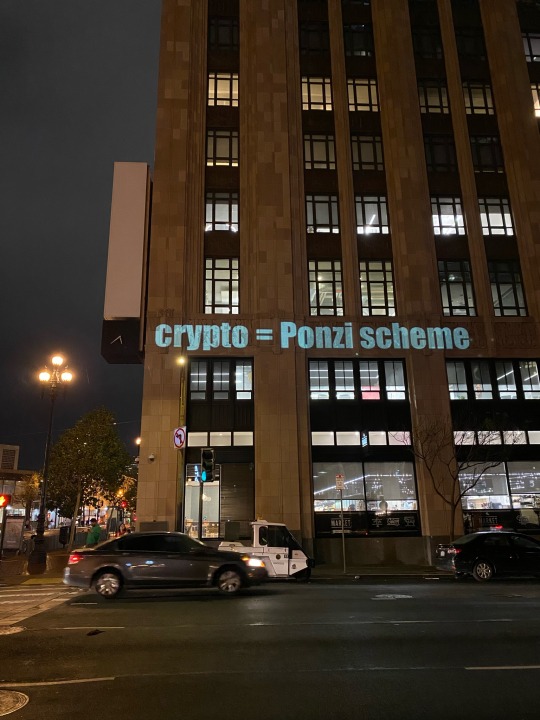
Projected at X-Twitter in San Francisco.
Solarpunks must be skeptical of anyone saying it’s important to buy something, like a Tesla, or buy in, with cryptocurrency. Capitalists want nothing more than to co-opt radical movements, neutralizing them, to sell products.
People shilling crypto will tell you it decentralizes power. So that’s a lie, but solarpunks who believe it may be fooled into investing in this Ponzi scheme that burns more energy than some countries. Crypto will centralize power in billionaires, increasing their wealth and decreasing their accountability. That’s why Space Karen Elon Musk pushes crypto. The freer the market, the faster it devolves to monopoly. Rather than decentralizing anything, crypto would steer us toward a Bladerunner dystopia with its all-powerful Tyrell corporation.
Promoting crypto on a solarpunk podcast would be unforgivable. That’s not quite what happens on S5E1 “Let’s Talk Tech.” The hosts seem to understand crypto has no part in a solarpunk future or its prefigurative present. But they don’t come out and say that, adopting a tone of impartiality. At best, I would call this disingenuous. And it reeks of the both-sides-ism that corporate media used to paralyze climate action discourse for decades.
Crypto is not “appropriate tech,” and discussing it without any clarity is inappropriate.
9 notes
·
View notes
Text
This is amazing. Also, we have an episode where we talk to Justine Norton-Kertson about Bioluminescent before it was released which, if you're interested, you can listen to here: https://shows.acast.com/solarpunk-futures/episodes/interview-with-justine-norton-kertson-about-bioluminescence-
(It was made when SP was still a bb spinoff of Solarpunk Futures pod ;) )
An Overview Over the Solarpunk Anthologies
I thought, where I am already here, trying to get everyone to engage with Solarpunk as more than just an aesthetic and pretty flowers, I should give a quick overview over the Solarpunk antholigies, that have been released so far.
Note that so far most releases within the genre are in fact short stories. Though if anyone is interested, I can make a list of the novels I am aware of!
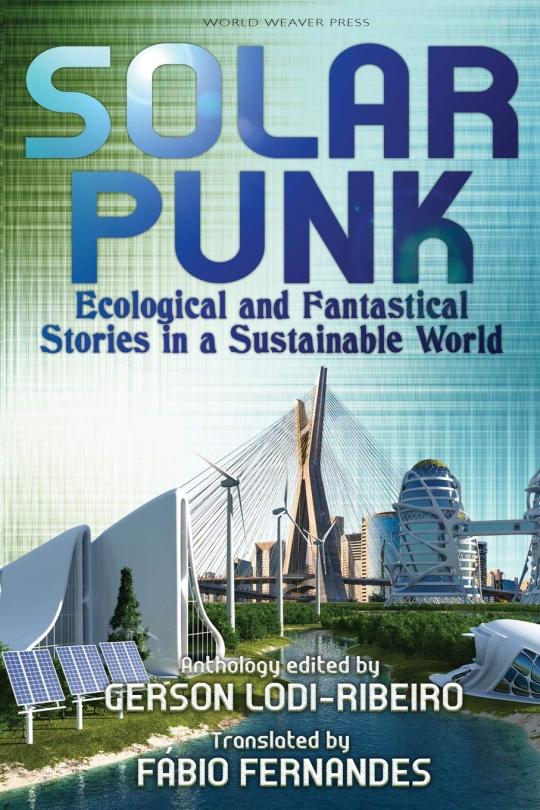
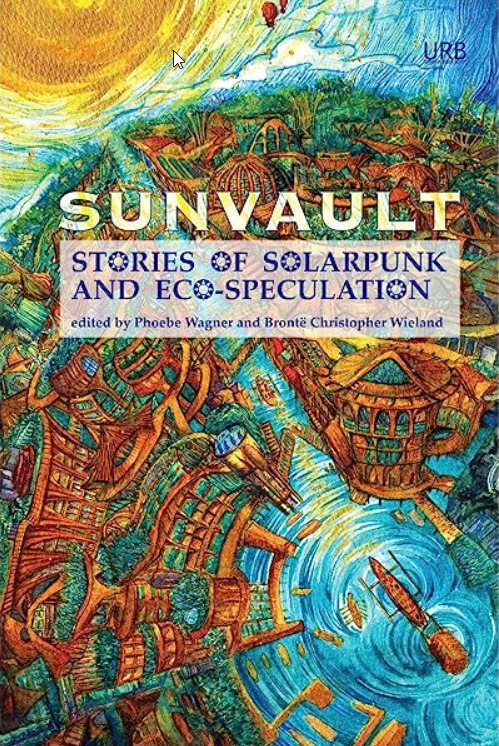
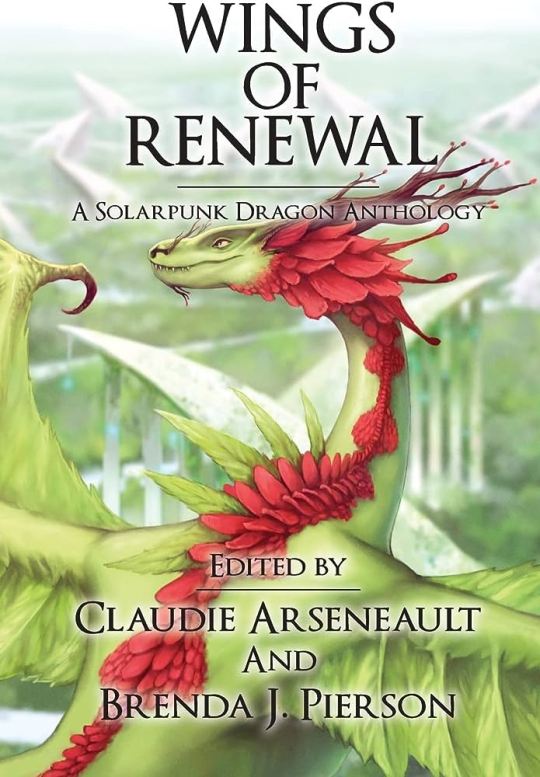
Solarpunk: Ecological and Fantastical Stories in a Sustainable World is pretty much how the genre got its start. The book was originally released in Brazil and only recently had been translated into the English language. It only covers a few stories, but those are a bit longer than your average short story to make up for it.
Sunvault: Stories of Solarpunk and Eco-Speculation has been quoted by many writers in the genre to have been a massive inspiration to them. The stories are very diverse and cover lots of ground.
Wings of Renewal: A Solarpunk Dragon Anthology is probably the weirdest out of this bunch. While all of the other anthologies mostly focus on either SciFi settings or stories set in the here and now, Wings of Renewal mixes Solarpunk with Fantasy elements. At times those stories are SciFi, too, at times they are really mostly fantastical.
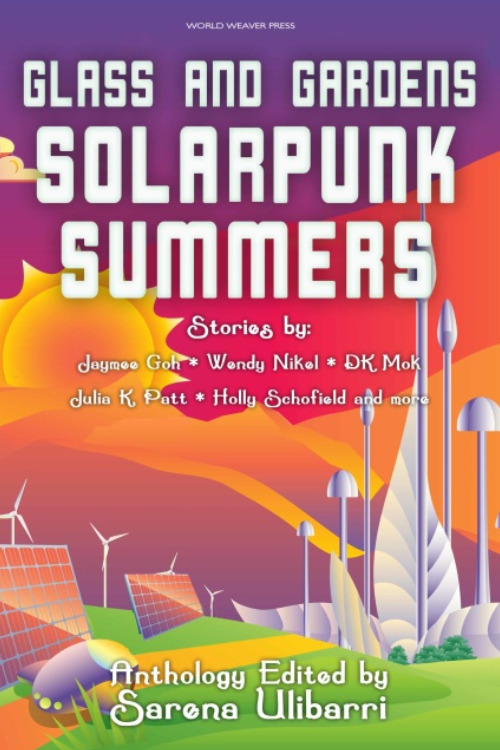
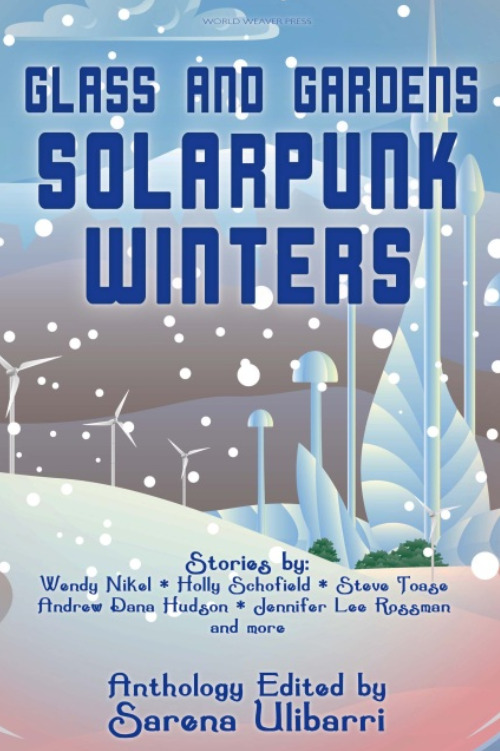
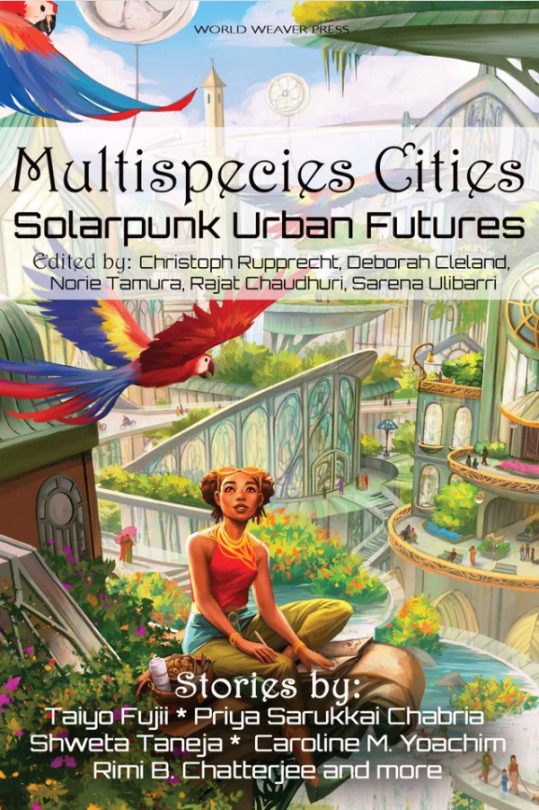
Glass and Gardens: Solarpunk Summers explores a wide variety of Solarpunk settings, some hopeful, some less optimistic. It is mostly set in warm and hot scenarios, though those can also vary quite a bit.
Glass and Gardens: Solarpunk Winters then went ahead as a "sequel" of sorts to explore the concept of Solarpunk in colder climates.
Multispecies Cities: Solarpunk Urban Futures has probably to be my favorite one from the anthologies edited by Serena Udaberri. It explores how humans and animals can live together in Urban settings. And once again, the stories vary from those set in a more futuristic and a more present setting a lot.
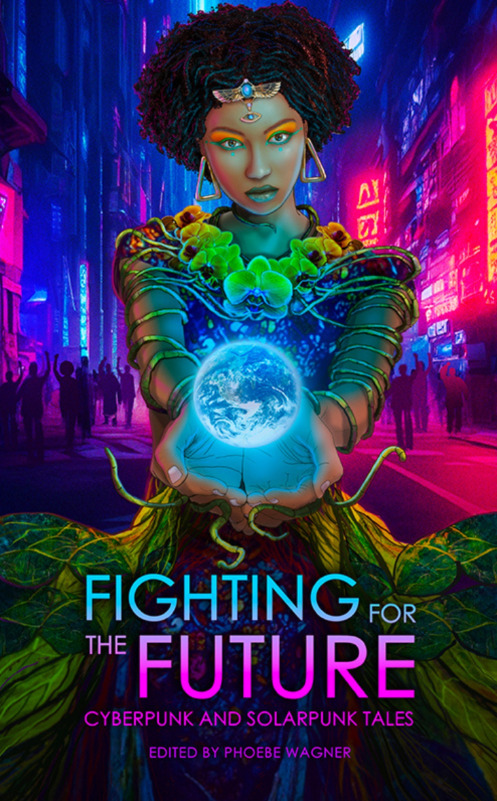
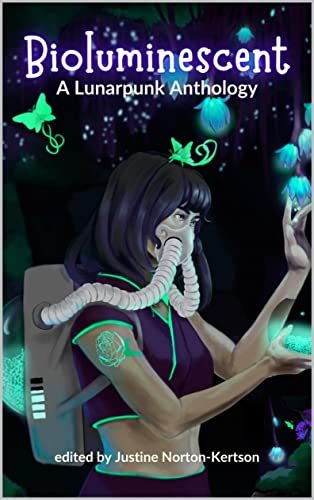
Fighting for the Future is the most recent of those anthologies, as it has only released last month. (And yes, this also means: I have not yet read it at all.) It features stories of Cyberpunk and Solarpunk futures - as well as stories where both intertwine!
Bioluminescent: A Lunarpunk Anthology is exactly what it says on the cover. An anthology featuring Lunarpunk stories. So Solarpunk with a bit more mysticism to go with it. And as this also only has released earlier this year I admittedly also have not gotten around to reading it yet.
This does remind me though: Would anyone be interested in me writing mini reviews to the stories in those anthologies?
#solarpunk#solarpunk anthologies#podcast#solarpunk futures#Justine Norton-Kertson#Solarpunk Presents#interview#go read these they are so amazing
557 notes
·
View notes
Text
The Lost Cause prologue, part III
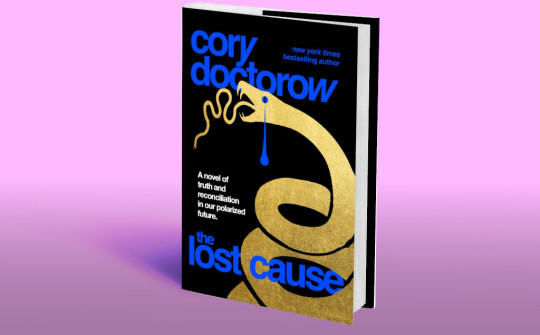
I'm coming to Minneapolis! Oct 15: Presenting The Internet Con at Moon Palace Books. Oct 16: Keynoting the 26th ACM Conference On Computer-Supported Cooperative Work and Social Computing.

My next novel is The Lost Cause, a solarpunk adventure about "the first generation in a century that doesn't fear the future." It comes out on Nov 14, and its early fans include Naomi Klein:
https://us.macmillan.com/books/9781250865939/the-lost-cause
Amazon won't sell my audiobooks, so I made my own, doing the narration this time around. I'm running a Kickstarter campaign to pre-sell the audiobook, ebook and hardcovers, including signed, personalized hardcovers – I hope you'll consider backing it:
http://lost-cause.org/
This week, I'm serializing the prologue to the book.
Here's part one:
https://pluralistic.net/2023/10/06/green-new-deal-fic/#the-first-generation-in-a-century-not-to-fear-the-future
And part two:
https://pluralistic.net/2023/10/07/met-cute-ugly/#part-ii

I woke at noon, the house hot because Gramps had left the blinds up in the front room, and ever since the big live oak had been cut up and taken away for blight, we’d lost its shade.
I used the bathroom, pulled on shorts and a tee, and went looking for breakfast, or brunch, or whatever.
“Gramps?”
He didn’t answer. That was weird. Gramps was a late riser and he rarely got up before ten, and then he took a long time to get going, listening to his podcasts and drinking coffee and sending memes around to his buddies with his giant tablet, with the type zoomed way, way up. He didn’t like going out in the heat, either, so in the summer he rarely left the house before four or five, once the sun was low to the hills. He’d left his coffee cup in the sink and his tablet on the table, so I knew he’d gone in a hurry. He hated dirty dishes and hated dead batteries even more.
I put his stuff away and thawed out some waffles and got a big iced coffee from the cold-brew jug I kept in the fridge and started the process of becoming human.
I gobbled my first waffle before the emotional weight of the previous night settled on me. Those emotions were way too big, so big that they all layered on top of each other, leaving me with nothing but numbness.
I did the reflex thing and pulled out my screen, giving myself a brief sear of shame for my mindless screen-handling, just as I’d been trained to do in mindfulness class. That was enough to prompt me to run through the checklist: Do I need to look at my screen? Do I need to look at it now? What do I hope to find? When will I be done? I answered the questions (Yes, yes, news about last night, when I’ve looked at two or three stories), and then unlocked it, but didn’t look at it until I’d poured myself another glass of coffee.
Two hours later, there was no coffee left and my eyes hurt from screenburn. I dropped my screen, came out of my trance, and stood up.
I’d gone viral. Or rather, Mike had.
My post had been picked up, first in Burbank, then statewide, then nationally, then internationally. Amateur comedians had edited the footage into highlight reels, moments chosen to demonstrate just how idiotic and hateful he was. Someone made a White Nationalist Bingo Card whose every square had a quote from Mike Kennedy. There were lots of jokes about inbreeding, hillbillies, musket-fuckers and ammosexuals, master race masturbation, senility, removable boomers—all the age-and class- based slurs that we weren’t allowed to say in school, but that everyone busted out as soon as we were off the property. It was pretty gross, but on the other hand, I couldn’t exactly argue with them. Bottom line was, Mike Kennedy had been up on that roof for no good reason, and he’d been ready to kill me to let him finish his stupid, senseless project. So yeah, fuck that guy. I guess.
I was pleased to see that I came off as a hero, with strangers around the world praising me for my cool head, saying I’d saved his life.
I put my plate in the dishwasher and wiped up my crumbs and checked the clock on the kitchen wall—I’d always loved its plain analog face with its thick and thin lines, the yellowing AC cord that came off it. It had belonged to Gramps’s own parents, and it was the only thing in the house I considered anything like an heirloom.
It was coming up on one and if I showered fast and ran, I could make my physics class. I decided to go for it, had the fastest shower in history, pulled on whatever was on the top of my dresser drawers, and sprinted for the street.
I was just jogging up to the entrance to Burroughs when I got a screen chime, which stopped me because, like all the students, I’d installed the school app that turned off audible alarms while I was on property during school hours. It wasn’t mandatory, but the punishment for having an alarm in class was confiscation, so . . .
I pulled out my screen as I panted by the doorway, mopping my face with my shirttail. It was a text from Burbank PD, informing me that Mike Kennedy was headed for a bail hearing in two hours, and I was entitled to present a victim impact statement, either recorded or in person. I’d known that the police could override the school app (there was a kid in my class whose parole office sometimes paged him, and the fact that he audibly dinged was just part of the package, I figured—a way to remind us all that this kid had fucked up bad), but I hadn’t expected them to ping me, let alone on school property.
I tapped out a quick thanks-no-thanks, and headed to physics.

If you'd like an essay-formatted version of this post to read or share, here's a link to it on pluralistic.net, my surveillance-free, ad-free, tracker-free blog:
https://pluralistic.net/2023/10/09/working-the-refs/#lost-cause-prologue

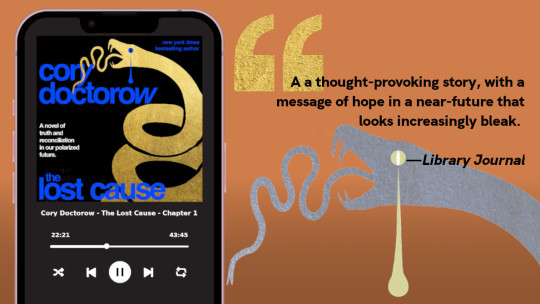
My next novel is The Lost Cause, a hopeful novel of the climate emergency. Amazon won't sell the audiobook, so I made my own and I'm pre-selling it on Kickstarter!
14 notes
·
View notes
Text
youtube
This week on Solarpunk Presents Podcast, Ariel chats with Selena Middleton, Publisher and Editor of Stelliform Press, all about publishing eco-fiction. What is eco-horror, and how does it relate to solarpunk fiction? What are the hallmarks of a good solarpunk story, according to Selena? How does history fit into visions of the future, and what does character have to do with it? Join us as we discuss all this and more.
Links: Stelliform Press website - https://www.stelliform.press/ Depart! Depart! by Sim Kern - https://www.stelliform.press/index.php/product/kern-depart-depart/ Another Life by Sarena Ulibarri - https://www.stelliform.press/index.php/product/another-life-by-sarena-ulibarri/ Green Fuse Burning by Tiffany Morris - https://www.stelliform.press/index.php/product/green-fuse-burning/ The House of Drought by Dennis Mombauer - https://www.stelliform.press/index.php/product/the-house-of-drought-by-dennis-mombauer/
#solarpunk#Solarpunk Presents Podcast#podcast#podcasting#eco-horror#ecohorror#stelliform press#Stelliform Press#genre#Selena Middleton#Sim Kern#Sarena Ulibarri#Tiffany Morris#Dennis Mombauer#publishing#genre publishing#science fiction#science fiction publishing#SF#sci-fi#SF publishing#sci-fi publishing#Youtube
20 notes
·
View notes
Text
:0 @solar-sunnyside-up I don't want to assume but I think you meant to tag me? V glad you like my work :). Yeah I've been seeing a lot of this type of complaint in the tag recently. It's crazy because I feel like most of the stuff I end up reblogging from the solarpunks I follow is political! We're posting about strikes and the climate and social services etc. Just because it's not the most philosophical tag doesn't mean politics aren't happening. I think some people fail to see the political power of a garden.
i think solarpunk is too much of an aesthetic. that tag is full of pretty photos of flowers. isn't it supposed to be an anarchist movement? the anarchism tag has actual deep conversations about politics and protests. the solarpunk tag is just 🌼🌻🌴☀️. where is the anarchy? you can do more than plant things. thats great and all, but few people seem to remember that its a political movement. put the punk back in solarpunk
#Solarpunk#Gotta get better about tagging all my posts lmao#Also follow ani and solar Sunnyside up and solarpunk presents podcasts if you haven't already!! Really good stuff :)
801 notes
·
View notes
Text
At the Forefront
Blog Post #7
Unreal as a new end-of-pipeline for concept artists
In a two hour podcast where Adrew Price from the Blender Guru channel interviewed legendary concept artist Shaddy Safadi on the topic ‘Is Concept Art Really Dead?’ (the answer of course being no). Shaddy Safadi explained that concept artists not only need to be able to paint as well as AI in order to utilise it in their art and other ways of using it as a springboard, he explained that it is perhaps time for concept artists to not just focus on the first stage of the production pipeline of concept art only. He explained that as 3D tools get more and more user friendly to create photo-real outcomes that concept artists should start picking up software like Blender, Substance painter and even the Unreal engine to bring their visions to life in 3D and execute the entire pipeline themselves. He feels that the future of concept art is on me where the boundaries between concept art, 3D modelling and final visual effects are blurred. He believes that there will be more single artists or small teams could handle everything from concept creation to final VFX or in my case game environments. It is worth noting that game programming is a more distanced skill from concept art than visual effects although ever evolving utilities like unreal blueprints are making this more accessible too.

Safadi is excited about this potential future where concept artists could be more present throughout the entire creative process effectively becoming “art gods” who can oversee and even execute all visual aspects of a production. The current advancements in AI, accessibility to affordable powerful computers and ever more accessible software will make it more achievable to be able to create art in this way. This suggestion is a major inspiration behind my production pipeline of my Solarpunk project where I will concpetualise and digital paint, model, UV map, texture paint and then create a detailed scene in Unreal 5, even dabbling in blueprints where necessary.
References:
Price, A. (2023). Is Concept Art Really Dead? With Shaddy Safadi. [YouTube Video] Available at: https://www.youtube.com/watch?v=-YevFQ2qG4Y [Accessed 8 August 2024].
0 notes
Text
Hi there, I'm Ariel Kroon, and this is my Tumblr thing. I'm an independent scholar and a freelance academic editor, and so I'm going to be crossposting from my blog (when I blog). I'm hoping this won't take me down too many rabbit holes, but you never know.
I did my dissertation on post-apocalyptic Canadian science fiction published between 1948-1989, so expect me to post about obscure SF as well as my Opinions on apocalyptic discourse, the apocalyptic imaginary, cyberpunk and solarpunk. I use an intersectional feminist lens, as well as thinking with ecocriticism, affect theory, queer theory and gender studies, and I have a weakness for/history in feminist philosophical thought and also (xtian, protestant, crc, dutch-settler) religion.
I'm a third-generation Dutch immigrant, settler scholar on the trad. territory of the Haudenosaunee, Anishinaabe and Neutral peoples and it feels weird to disclose this because I'm also a millennial who grew up with LJ and non-anonymity online makes me feel really squeamish and vulnerable, but that's a privilege a lot of people don't get these days. Expect me to wrestle a lot with the discourse/idea of reconciliation in so-called Canada, cause I'm complicit as hell but I'm trying to do my best to be a conscientious race-traitor.
I also struggle with chronic fatigue, chronic pain, brain fog, short term memory issues, executive functioning, and I am on the road to figuring out what I suspect is the fact that I'm on the spectrum, so sometimes I don't really have the spoons or grace for being the best ally I can be. The discourse of the perfect activist is one I want to push back against, as someone with multiple disabilities; the excuse of being "too disabled" to ignore the suffering of others is, I think, a harmful myth that many of us - intentionally or not - tend to buy in to and I want to also push against that.
Disability studies isn't something I'm very familiar with at all, since my disabilities manifested after a car crash in 2019 (which exacerbated all the underlying issues I was busy masking / repressing while being in grad school, because I suddenly lost the ability to keep up my coping mechanisms). I look forward to learning more about pretty much all of these things, by the way.
Speaking of being very new to a field, I'm co-host of Solarpunk Presents Podcast (@solarpunkpresentspodcast); come along and learn with me and Christina De La Rocha about people doing their best in the present with an eye towards a better future world for all.
#ariel kroon#independent scholar#academia#scholarship#academic editor#freelance#blogger#ecocriticism#solarpunk#cyberpunk#science fiction#apocalypse#apocalyptic imaginary#intersectional feminism#affect theory#queer theory#gender studies#feminist philosophy#religion#millennial#settler scholar#Canada#LJ#livejournal#online anonymity#spoonie#spoonielife#actually disabled#disability studies#solarpunk presents podcast
6 notes
·
View notes
Text
many of the technologies and practices that solarpunks draw into their imaginings already exist: solar and other renewable energy, urban agriculture, or organic architecture and design. Like sci-fi authors, solarpunks remix the present to produce an alternative future. SOLARPUNK WRITING CONTEST currently accepting submissions *Short stories (up to 5,000 words) & artwork *No contest entrance fee! *Stories will be read on the "Stories from the Future" podcast. *Stories will be included in our next anthology. www.StoriesfromtheFuture.co May the Future be with You!
128 notes
·
View notes
Text
If this interests you, I'd highly recommend a read of Erin Alladin's blog, Earth Undaunted; she spoke to me on a recent podcast about this, specifically from a lens of gardening / permaculture practices in a disabilities framework. She wrote a whole book on it, which is only $10 for the ebook, but it's also an amalgamation of a lot of her best blog posts and TikTok content. Highly recommend.
-Ariel
One of the things I think about a lot is productivity comparisons between conventional and unconventional agriculture. Mostly because that's the first question you get asked when you talk about anything that's outside the norm*, but, on what metric are we measuring? Per acre? Per hour worked? Per cost of input? Are we measuring yields of product or dollars earned?
This question also, to me, rings of fear. Fear of food shortages, which are really a problem of greed & distribution, not the world's capacity to grow food. If we were really worried about calories though, I think we'd at least switch to pastured animals instead of sending so much corn and soy to livestock (for any non-farmers out there, you do not get nearly the calories out of a chicken or pig that you put in- you get much less**). Or we would put more effort into making cities great places to live so we stopped turning farmland into suburbia. Or we would be much more concerned with how to prevent erosion & loss of arable land. But we don't, and we're not.
I also think of the complexity of non- conventional farming, and how instead of it being a return to the past, it actually relies on new information and methods***.
Take the plot of land that I'm working to make into a market garden. It's soil is, from a farmer's perspective, crap. It's gravely, sandy, very little organic matter. If I were to farm it conventionally, I'd basically have till to open the soil and kill weeds, and then provide all of the plant nutrients through fertilizers, which would cause the plants to kick out their symbiotic fungi, leaving them vulnerable to pathogenic fungi, and more dependant on me for water. There would also be bare soil everywhere, increasing evaporation & providing plenty of opportunities for new weeds. My costs would be very high, paying for fertilizers, pesticides, & herbicides, and I would have to water, a lot. It probably wouldn't be at all economically feasible to grow food on this plot using conventional methods.
Now, I look at it and say, I'm going to do no-till. I look at the hard, weedy, depleted soil and there's no way a seed is going to be able to come up through that. But, I'm not just doing no-till, because I'm not looking at it from a conventional mindset and just trading out one practice. I'm doing basically everything different from above.
Instead of tilling, I'm laying down a thick layer of mulch, to shade out the weeds, increase soil organic matter (increasing the amount of water and nutrients the soil can absorb & good on to), and feed the soil ecosystem. By the time spring rolls around, the soil underneath will be much better, but I'll still add more compost in most cases.
Instead of fertilizers I've had to pay for, I'm using mulches that I got for free from my gardening work & composts made for free from restaurant kitchen wastes****. I'm going to use over crops, plants that fix nitrogen and also serve as perennial hosts to beneficial soil fungi, which will also form symbiosis with most of my crops, increasing their resistance to pathogenic fungi while also providing them with increased access to water and soil minerals.
Instead of bare soil, there will be mulches and cover crops every where. Instead of monocrops & pesticides, I'll be intercropping which will help by hosting beneficial native insects that will chow down on aphids and other crop pests.
From this framework, there's an upfront investment of effort and planning, but farming this land now seems feasible.
And the thing is, each of those choices is backed up by research. We know so much more now about soil and nutrient cycling and how it actually works than when conventional ag really got started. We know so much more, and so many practices are new, so growing non-conventionally isn't a step back into the past of how things were grown.
But at the same time, it's not exactly completely information either- other cultures have different ways of growing food crops, and if you broaden your concept of what cultivating plants looks like, there's examples everywhere. We're just studying it now and providing it scientifically.
*and I honestly think that it's a result of the extractive mindframe that comes from being the decendants of colonizers. Just look at the different perspectives between many western foragers ideas and Indigenous peoples' relationship with the land.
** chickens are one of the most efficient, with a feed conversion ratio of 1.6, which means for every 1.6 pounds of food you give them, you can expect the chicken to gain 1 pound (cows are over 4 pounds of feed to pound of live weight, and pigs are 3 to 4ish). That's the whole bird though, counting all the parts we don't eat- guts, feathers, bones, etc. Even so, a pound of chicken food has over 1300 calories, and is about 20% protein for starter/grower, where as a pound of chicken has about 500 calories and about 30% protein (for dark meat, you get fewer calories from white meat). I'm not saying everyone should give up meat, but I am saying that the amount of meat in mainstream diets has increased dramatically, much of it comes from cafos where animals are fed on grains & legumes, and if we're measuring productivity and yield per acre because we're worried about feeding the world, this is a huge factor. Look up how much of the corn & soy crop goes to actually directly feeding people.
*** from a western, colonizing prospective
**** is this a particular boon from my particular circumstances? Yes. But everyone has their own challenges and resources, there is no cookie-cutter solution to all agriculture, everywhere. You have to find the solutions that work for you.
#gardening#permaculture#resources#spoonie#gardening with disabilities#EarthUndaunted#Erin Alladin#solarpunk presents#podcast
817 notes
·
View notes
Photo
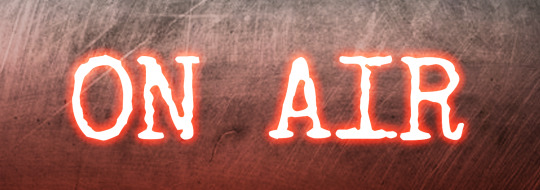
Welcome, Anyone.
Metal Steve Productions is proud to present; Station Arcadia. Station Arcadia is a queer audio drama podcast set in a dystopian world where steampunk, cyberpunk, solarpunk and diselpunk societies all exist side by side. The radio host, a nonbinary lesbian named Kass, broadcasts diverse stories from across the land that together, tell the story of a revolution, and hope in the face of a dying world.
Interspersed throughout these broadcasts is live audio footage that focuses on four different protagonists - one for each society. As the world unfolds over the course of the broadcasts, these four characters embrace challenges, make mistakes, and continue on their own journeys.
Station Arcadia’s pilot episode, By The Wayside, is available today on all podcast streaming services. By The Wayside follows a technology scavenger from the cyberpunk society of Talsoria. You also meet 16 year old Memorie, and listen as fae attempt to find out just where those Talsorian Revolutionaries are hiding…
Learn more at https://www.stationarcadia.com/, or listen find your favourite streaming platform for episode one at https://pod.link/stationarcadia
#station arcadia#arcpod#podcast#new podcast#indie podcast#podrec#podcast community#ep1#e1#podcast premier#audio drama#queer#lgbtq+#lgbtq#lgbt#cyberpunk#solarpunk#dieselpunk#steampunk#1. By The Wayside#talsoria#new episode#sci-fi
158 notes
·
View notes
Video
youtube
An interview on Solar Futures, a podcast presented by Solarpunk Magazine, with me and my coeditor Clark A. Miller about our books The Weight of Light and Cities of Light.
2 notes
·
View notes
Text
CanvasWatches: Carole & Tuesday
A charming SciFi anime focusing more on the cast’s day-to-day lives than some major sociopolitical conflict that requires laser gun diplomacy? Set on a Terraformed Mars with brick and mortar solarpunk aesthetic? I can get into that.
The fact that Carole & Tuesday is a science fiction story came as a surprise, as most of the buzz and promotion that crossed my social feeds focused on the street performance aspects. Then, surprise! Tabletop fast food ordering and pizzerias that grow their tomatoes in house![1] Which is the sort of speculative fiction I’m enjoying nowadays: normal life with the fantastic acting as seasoning to spice up the world around them.
I’ve never paid special attention to music. I listen to music obviously, but rarely in any sort of analytical capacity. It’s pretty sounds that help fill in the background while I write, or to convey emotion in a musical, or to mark the start and end of a show I’m watching. I’ve never sought out music to listen to when looking for entertainment, it’s always a byproduct of whatever media I’m engaged with at the moment. Heck, these days, when I’m too lazy to set my car radio up to play a podcast, I just drive in silence.[2]
I sometimes feel I’m missing something by not engaging with the art form in a more conscious manner, and I only recently became aware that albums are a carefully curated thing instead of a collection of the performer’s most recent songs, so… yeah. Kind of a cultural blindspot.[3]
This tangent doesn’t even end with a neat little note of how Carole & Tuesday had inspired me to consume music in a more deliberate and contemplative manner. The soundtrack includes plenty of insert songs I happily threw on my background noise playlists,[4] and what few albums I seek out are video game and anime soundtracks.[5]
Carole & Tuesday was chiefly directed by Shinichiro Watanabe, who’s name was made with the Jazzy Space Epic Cowboy Bebop and Hip-Hop Samurai Series Samurai Champloo. It was probably inevitable he would produce an anime where music took front stage instead of informing tone.
Carole & Tuesday takes inspiration from Pop, but is unafraid to feature and mix other genres, such as Opera and Rap.[6] What’s really exciting is the decision to have the insert songs performed in English.
Historically, when diegetic music is present in anime, the song is performed in Japanese, and most dubs make the smart decision to leave the japanese audio and subtitle them. I may prefer dubs for my various reasons, but I wouldn’t dare ask for the policy on subbed music to change. Carole & Tuesday took an international view to its production, and thus used the most widely spoken language when no one (reasonable) would begrudge the use of Japanese performers.
Netflix picked up the show as part of their continued haphazard attempts to seize the genre with an attitude out of the early 2000s, and the company tapped to record the English dub did an admirable job matching voice performances believably similar to the singing voices.
Which may be the first time that speaking actors were hired to fit the singers.
The story takes place on Mars in the future year of… 50 years after humanity started migrating to Mars. I cannot find a year cited, which is the smart and wise choice and I am super annoyed I’m not going to be able to make jokes about the production's attempts and failure to predict the future.
50 years after starting to migrate over to the red planet, humanity has terraformed large swathes of Mars into a Solarpunk paradise. Earth is apparently not in a great state as refugees are desperately making their way to the planet, but Earth remains offscreen for the entire run. Fortunately no one has any giant robots,[7] so the two planets aren’t at war. While Mars has been made hospitable enough, the atmosphere does occasionally mess with the genetics of residents.
That’s just background details, however. The story is really about the titular duo. Tuesday is introduced fleeing the mansion of her politician mother, hopping onto a cattle train like Kiki, and riding off to Alba City with only a quitar and robotic luggage to keep her company, where she stumbles upon Refugee Orphan Carole busking with a keyboard. The two have a jam session and decide to become a musical act.
Meanwhile, famed child star Angela Carpenter[8] is setting to transition from a modeling career to an exciting career singing. Her mother pulls strings and utilizes her connections to team up with Tao, a genius of Artificial Intelligence Design who is willing to use his technology to provide Angela with computer generated music and lyrics.
Thus we have the start of a sci-fi John Henry Tale where the battle is not hammer and steel but instruments and voice.
I say ‘the start’ because while the two teams utilize different methods to produce their music, their methods are never weighed against one another. In fact, there’s barely a one-sided rivalry, as Angela is jealous of the titular duo’s ability to enjoy their career, and our two heroes take only a polite, professional view of Angela’s rising career.
Carole and Tuesday are both weighed down by a common problem with anime protagonists: they’re just nice. There’s a certain fear when writing protagonists, especially females, of accidentally making them off-putting that the writers overcorrect and don’t let the hero make mistakes or have much personality, to the point that Carole and Tuesday have very little agency.
Instead, it’s Gus, the ex-rock star manager the duo acquire, that does the leg work and takes risks while Carole and Tuesday just sing nice songs then sit back while the plotlines orbiting their rise to success are resolved by the men.
The show also can’t choose a lane, playing with several story threads that could carry full 24-episode stories by themselves, but instead are dealt with as lightly as possible.
We start with the story of a run-away from decadence and a refugee bringing their world views together, but that instead goes into a tournament arc disguised as a talent contest, then the drama of navigating the music industry, before ending with the presidential run of Tuesday’s mother causing public unrest. Carole and Tuesday don’t make a meaningful choice that affects any of these stories.
Meanwhile, Angela gets a story of asserting her identity while already in public view, facing dangers both external and internal on her journey.
Surprisingly, this is the first show in a while that I didn't resent for transitioning out of the episodic, playing with the premise portion. While Carole and Tuesday were attempting to get their big break, bopping around misadventures trying to get contacts, gigs, and filming a music video, Angela looms in her plotline, building up to the inevitable rivalry.
Angela is introduced just before her mother, Dahlia, starts reworking Angela's career from modeling to singing, hiring Tao, renowned AI designer, as Angela's producer. Angela experiences mild paranoia from Tao's standoffish nature, machinery, and making a holographic simulation of Angela. So Angela had a more consistent narrative during the first arc.
Introductions out of the way, it's time for everyone's favorite trope: the tournament arc! In the form of ‘Space!'s got Talent’ Generic Brand Named into Mar's Brightest. The main duo meets their rival, backstage drama ensues, some very good music is performed, and things are set up to technically give both Carole and Tuesday as well as Angela a win at the end.
With publicity achieved, Gus starts getting to work preparing the girls' debut album and booking appearances, as well as meeting other artists and (briefly) Carole’s father. We learn about Gus’s past client, Flora, who dropped Gus as soon as she found success, then found herself without a support base and spiraled into depression and addiction. Carole and Tuesday remain upbeat and optimistic.
Meanwhile, Angela starts getting harassed by a stalker and feeling helpless and poorly supported by those around her. Tao takes point on stopping the stalker when the police fail, ultimately taking him down before the stalker could pull a Mark David Chapman.
The story bleeds into the final act, as the presidential campaign of Valerie Simmons, Tuesday’s mother, moves forward in prominence. The AI algorithm Valerie is utilizing suggests she take an anti-immigration stance, which the woman follows in an attempt to further her career. Musicians are getting harassed by law enforcement, Tuesday’s brother Spencer is becoming uneasy with being an accessory to the campaign, and starts meeting with a reporter with information that Valerie’s campaign manager orchestrated a terrorist attack to villainize immigrants. Spencer and the reporter argue over how many chances to give Valerie, and agree on Spencer taking the evidence to Valerie, and if she doesn’t back down, then they’ll leak the scandal. Valerie, seeing the crimes committed for her benefit, gracefully renounces her candidacy. It’s very heart warming.
Carole and Tuesday write a protest song, and gather friends to sing it. This protest song has no observable impact.
Meanwhile, Angela learns she’s adopted, and her mother suffers a heart-attack shortly before Angela is set to win a Martian Grammy, and Angela spirals into depression and prescription drug abuse, to the point of collapsing at the end of her Grammy performance, being rushed to the hospital and missing her mother’s passing and funeral. Angela is adrift. She has no family, no support, and is just lonely.
Tao, who was working to sabotage Valerie’s campaign and burning as many bridges as possible after being targeted for refusing to assist the campaign, appears in Angela’s hospital room to drop a bomb: both he and Angela are designer babies, and though Tao must go into hiding now, he does intend to look out for his little sister.
Angela joins the performance of Carole and Tuesday’s protest song.
If it’s not already clear, I feel the story of Carole and Tuesday themselves was pretty lacking.
So, how would I rework this? Step one: we’re either cutting Carole and Tuesday, or combining them into a single character and making Angela the second. With the second option, Angela can maintain her backstory, but take Carole’s introduction of fleeing her family mansion and attempting to strike out on her own, meeting up with Carole and forming an act. To maintain the final arc, Carole would need to be reworked into the abandoned daughter of Tuesday’s late father, making her the half sister of Spencer and something to be hidden by Valerie Simmons’ campaign.
We then intermingle the two plotlines: Gus maintains his managerial position, and eventually convinces Angela to use her connections and mother to get her career jumpstarted, Ms. Carpenter still brings in Tao to write music, and now we can lean more into the AI-written music versus human compositions subplot as well as creative differences, which can lead to an arc where Angela and Carolday split to attempt solo careers, each taking a different manager.[9] Dahlia still has her issues and passes away, Angela her depressive spiral, but now Gus gets pathos by being there to help his client out of self-destruction, and the final number can also be a reconciliation of the main musical duo. The song can even be a combination of AI and human composition.
Carolday, meanwhile, discovers her relation to the anti-immigrant candidate and has to decide if she wants to finally have a family with Valerie and Spencer or stand up for her beliefs and assist a politician in bringing the campaign down. The resolution of the political plot can remain a happy compromise, but Carolday gets a slightly more active role in it.
The animation and world-building is great, and Angela’s arc is very strong. But the writing was too afraid to let either Carole or Tuesday dip into unlikeability that they become props to their own storyline, which is made further unfortunate as their supporting cast that do make decisions are mostly men.
The series is also riddled with a lot of good starts. Many short vignettes or minor details that could be made into full animes by themselves. Show more of Carole and Tuesday’s attempts to break into the music industry while also trying to pay bills and put food on their table. An expansion on the other competitors at Mars Brightest.[10] Heck, expand the roster of the competition and dig more into backstage drama. Carole’s father, who was sent to prison and found his wife dead and daughter sent to another planet upon his release, could carry a story of his own on his back! Valerie’s presidential run and the plight of Earth immigrants given more attention. Heck, even the story of how Earth, the origins of the human species, fell into being a third-world planet people are desperate to leave.
I’d even watch a series about the solarpunk pizzeria that grows their own tomatoes.
The music is really good, however, featuring many artists and styles, and those by our main duo wouldn’t sound out of place on a car radio or licensed on a primetime television show.
It’s a good show, but not an eternal classic. Maybe a second choice for someone digging deeper into anime. However, if its placement on Netflix means it’s someone’s introduction to Anime, that wouldn’t be terrible. Give it a watch if you want something to wind down for bed, or want inspiration for your own speculative fiction.
Kataal kataal.
-
[1] Solarpunk’s neat. [2] Mostly because I lost all my preset stations last time I took my car in for fixing, and I don't actually know any to punch in. Also, I use youtube for music when writing. [3] Also means I’m wholly unprepared to find music when I finally get a podcast project off the ground. [4] The soundtrack is very present on Spotify, which is nice. [5] I am finding myself increasingly intrigued by vinyl records, however. Probably a bit extravagant, and difficult considering my narrow interests. [6] Presumably to annoy fans of both. [7] Bam! Gundam reference! Anyone have Bingo yet? [8] Though I could swear they never use her last name on screen. [9] I’d find it amusing if Angela takes Gus and Carolday teams up with Dahlia, but the rest of my outline works better if Angela remains with Dahlia. [10] Though this one’s not a major loss. Typical tournament arc stuff.
3 notes
·
View notes
Text
Birding is super important! We have a whole episode about it ;)
If I say “aww look at the birds” n you say “they’re just sparrows” I’m killing you. Find beauty in nature or else.
46K notes
·
View notes